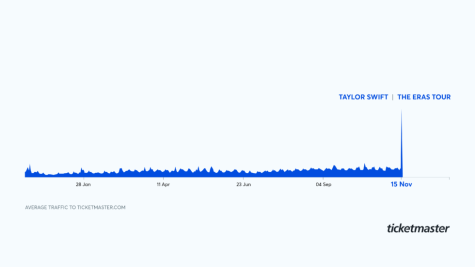Buying concert tickets is known to be ridiculously difficult, and through the recent Taylor Swift fiasco, Ticketmaster has revealed itself as the primary culprit.
Ticketmaster and parent company Live Nation Entertainment have dominated the live entertainment scene since its merger in 2010, including concert ticket sales. However, exorbitant pricing strategies and unfair access may very well mark the company’s downfall.
On Nov. 15, presales for Swift’s “The Eras Tour” left fans battling a broken system. Managing to receive a Verified Fan presale code was itself a lottery. Transactions failed as fans swarmed the site, sending many into the waitlist without even a chance of buying tickets.
“The site was supposed to open up for 1.5 million verified Taylor Swift fans. We had 14 million people hit the site, including bots, which are not supposed to be there,” said Ticketmaster chairman Greg Maffei in CNBC’s Squawk on the Street.

Those lucky enough to get a presale code found themselves experiencing periodic outages and hours-long virtual lines. Unprecedented demand eventually caused the site to crash, leaving many verified customers empty-handed.
Any remaining hope of acquiring tickets was crushed when, in a Twitter statement on Nov. 17, Ticketmaster announced the cancellation of the next day’s general sale “due to extraordinarily high demands on ticketing systems and insufficient remaining ticket inventory to meet that demand.”
Ticketmaster issued an apology to Swift and her fans but continued to defend their platform. The post appears to blame Swift’s popularity for the unprecedented traffic and goes on to boast about record-breaking sales and Ticketmaster’s domination of the market.
“Interestingly, AEG [Presents], our competitor, who is the promoter for Taylor Swift, chose to use us because, in reality, we are the largest and most effective ticket seller in the world,” Maffei said in the CNBC interview. “Even our competitors want to come on our platform.”
The reality is that Live Nation Entertainment currently corners the market, leaving both fans and artists with no choice but to use their services. AEG Presents revealed to CNBC that they could not avoid working alongside Ticketmaster because it had exclusive deals with the vast majority of venues in Swift’s tour.
Widespread calls for corruption prompted government intervention. According to the New York Times, the U.S. Department of Justice opened an antitrust investigation on Nov. 18 focused on whether Live Nation Entertainment has abused its power over the live music industry.
On Nov. 19, Live Nation Entertainment responded with a statement highlighting the competitive nature of the industry and denying all antitrust claims.
However, the corporation faces much less competition than it is willing to admit. Ticketmaster is in charge of selling tickets, while Live Nation provides venues and contracts with artists, so merging the two allows them to control 70% of the ticketing and live event venues market.
Such a monopoly makes exploitation all too convenient. Because Ticketmaster is often the only option for purchasing tickets, it can easily set unreasonable fees and charge customers extra. It’s unhealthy for a single company to have so much power, and reversing the merger is absolutely necessary to maintain balance in the industry.
“The Eras Tour” debacle is a wake-up call for music fans. It’s time to fix the system, and ending Ticketmaster’s monopoly is the first step.












